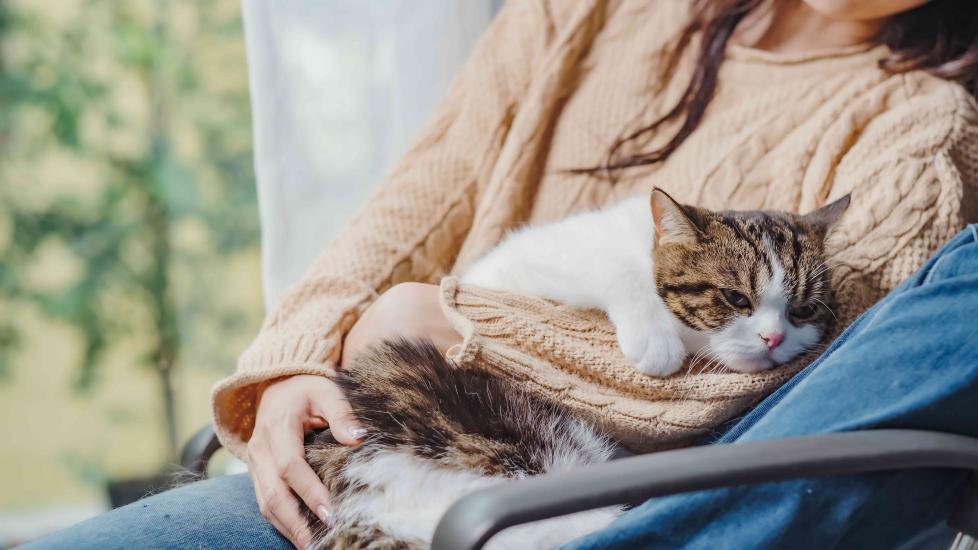7 Common GI Problems in Cats
Whether it’s the hairball you stepped on this morning or the diarrhea you had to clean up this afternoon, gastrointestinal (GI) problems have a way of getting a cat parent’s attention. But GI problems are more than just inconvenient—they can be signs of serious trouble.
Here are some common GI problems in cats and what to do about them.
1. Intestinal Parasites
Parasites are a common cause of GI problems in cats. Common cat parasites include:
Left untreated, intestinal parasites can make cats very sick, causing symptoms such as vomiting, diarrhea, weight loss, and poor growth.
Getting rid of intestinal parasites is fairly straightforward. First, the parasite is identified, often through a microscopic fecal examination performed by a veterinarian. Then the cat is treated with an appropriate deworming medication per label instructions and veterinary guidance.
Some common deworming medications include:
2. Hairballs
Hairballs might be common, but they are not always normal. Hairballs generally form either because a cat is shedding excessively because of a skin problem or due to gastrointestinal dysfunction.
If your cat only brings up the occasional hairball and seems perfectly healthy otherwise, home treatment is a reasonable first step:
-
An indoor diet or hairball formula may be useful to help decrease incidents of hairballs.
-
Supplements like a hairball gel makes swallowed hair less likely to clump together may also be useful.
-
Adding fiber to the diet can help move hair through the GI tract.
-
Brushing your cat more frequently will remove excess hair.
Make an appointment with your veterinarian if none of these solutions do the trick.
3. Constipation
Constipation occurs when feces become too large and/or hard to be pushed out of the colon. Constipated cats typically strain in the litter box but produce little in the way of feces. Any stool you do see is often dry, firm, and small.
Constipation can be caused by:
-
Poor gastrointestinal motility
-
Pain
-
Neurologic problems
-
Obstruction of the large intestine
-
A condition called megacolon, which has an unknown origin
Treatment a constipated cat involves identifying and correcting any underlying disorders and removing the impacted feces either with enemas or manual removal under sedation. Never give your cat an enema at home without first consulting with a veterinarian because some types can be toxic for cats.
If your cat is at risk for recurring constipation, increasing water intake, dietary changes (e.g., high fiber, low fiber, or hypoallergenic foods), weight management, and increased exercise can help decrease the frequency or severity of episodes.
4. Foreign Bodies
Cats are curious, and some will put just about anything in their mouths … and then swallow. If those objects are small or at least partially digestible, they can travel through the gastrointestinal tract without incident. But in a worst-case scenario, they become stuck somewhere along the way.
Gastrointestinal foreign bodies typically cause poor appetite, vomiting, and discomfort in cats.
A veterinarian who suspects that a cat has swallowed something inappropriate will usually take abdominal X-rays to look for evidence. The foreign body may be obvious, but more frequently vets can only see hints that there is something in there that shouldn’t be.
Sometimes, removing a gastrointestinal foreign body can be done with an endoscope. But in other cases, exploratory surgery is necessary to remove the object and repair the damage it has done.
5. Inflammatory Bowel Disease
Inflammatory bowel disease (IBD) causes symptoms that are seen with many gastrointestinal problems: vomiting, diarrhea, weight loss, and/or poor appetite. But because IBD can only be identified with a biopsy, it can be challenging to diagnose.
IBD can be caused by some combination of immune dysfunction, food allergies, bacterial overgrowth, metabolic disease, food intolerance, parasites, environmental stress, and/or genetics. Often, a cat’s symptoms are mild and/or intermittent to begin with but can get worse with time.
Treatment for IBD often involves feeding a hypoallergenic diet and, if that is insufficient, suppressing the immune system. A veterinarian may prescribe antibiotics, corticosteroids, chlorambucil, and other medications depending on a cat’s response.
6. Food Allergies
Cats can be allergic to some ingredients in food, just like humans. Food allergies in cats may appear as itching and skin sores or as upset stomach causing diarrhea and/or vomiting.
The most common food allergies in cats are to beef, fish, or chicken. Less commonly, allergies can occur to wheat, corn, dairy, lamb, egg, barley, and rabbit.
Diagnosing food allergies can be tricky. The ideal method is to perform a rigorous food trial (8–12 weeks of feeding your cat nothing but water and a prescription hypoallergenic diet). If your cat’s symptoms disappear, you can continue feeding them that food or slowly reintroduce traditional ingredients to determine which one(s) your cat reacts to so you can avoid them in the future.
In addition to diet changes, some cases of food allergy may also require treatment with an immunosuppressive drug such as prednisolone, budesonide, or chlorambucil.
7. Cancer
Lymphoma (also called lymphosarcoma) and other types of cancer in cats may be diagnosed with symptoms of gastrointestinal disease. Surgery, chemotherapy, radiation treatment, and palliative care (therapies that make patients feel better but don’t directly address the underlying disease) will often prolong and improve the quality of life for cats with cancer.
Health conditions other than those mentioned here can also be to blame for a cat’s GI problems. Talk to a veterinarian if you have any concerns about your cat’s health.
Featured Image: Adobe/Wanwajee
